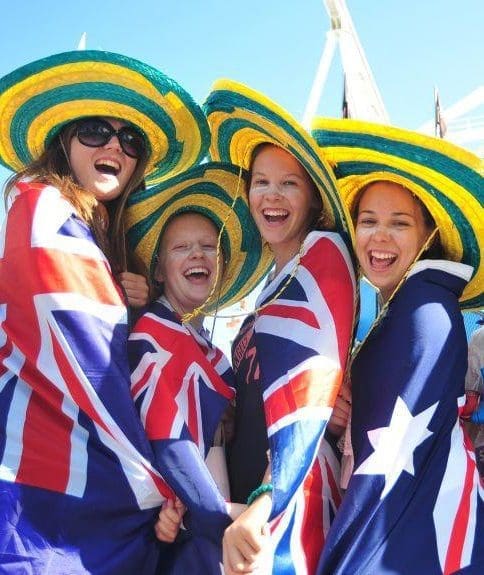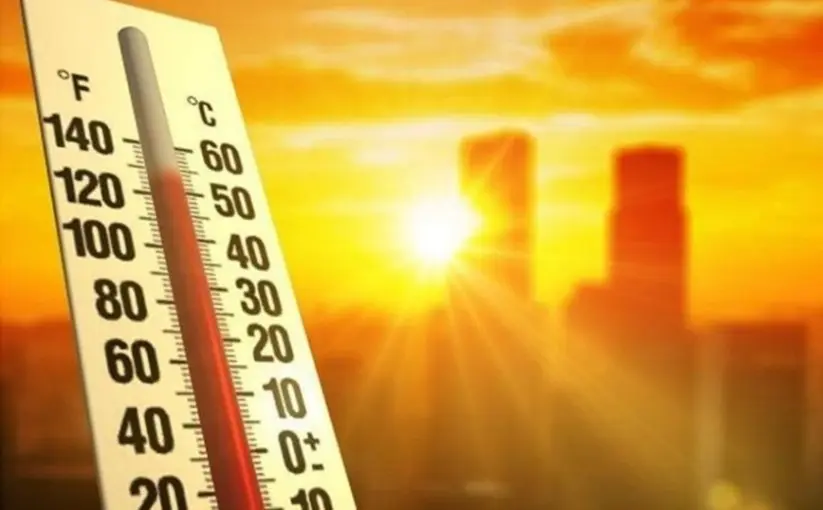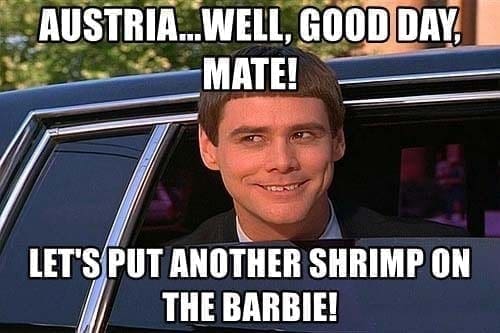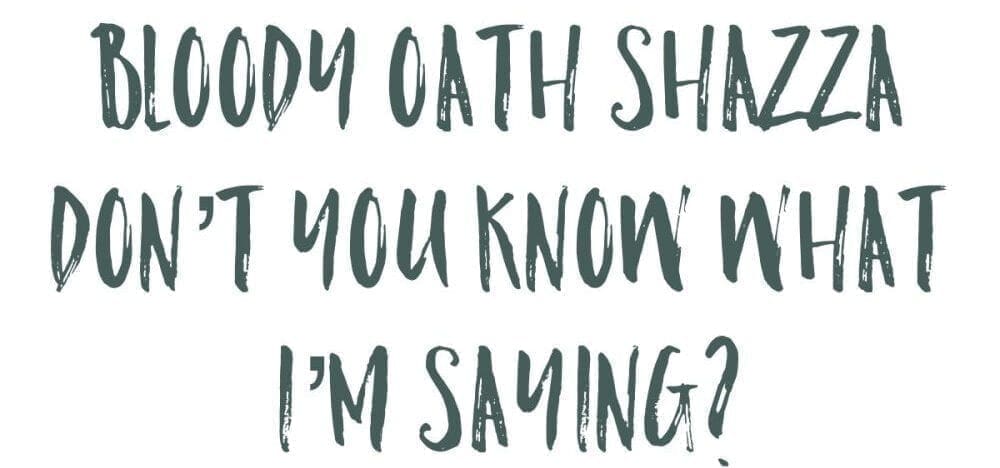New Australian slang terms have sprung up during the COVID19 pandemic. But why do Australians need slang for everything?
Amid the unprecedented global chaos of COVID-19, Australians keen to lighten the mood have predicted the new slang terms which will be used to talk about the COVID19 pandemic for years to come.
Words like ‘iso’ and ‘quazzie’ could be helping Australians cope with coronavirus. Around the world, Aussies are known for being laid back, easy-going, and bloody hard to understand.
And in times of crisis or trouble, they stick to their guns and keep coming up with new lingo that properly expresses what they want to say in as few letters, words, or sounds as possible.
ALSO READ: Moving To Australia? 6 Pros & Cons Of Moving To A New Country
Australian slang


WHY AUSSIE NEED SLANG FOR EVERYTHING
As a Filipina who married an Aussie, there are times that I can’t understand some of the slang words my husband and his mates are saying. I’m wondering why they need to shorten their words? Why do they do that? Well… Australians have long been notorious for shortening or simply changing words beyond recognition, using terms like ‘arvo’ for ‘afternoon’ and ‘crook’ to describe the sensation of feeling sick.
I reckon, creating more Australian slang is important to their identity, and they like to poke fun at things that should worry them — it’s their way of coping.
Subsequently, the shortlist for this year’s award, as voted for by The Australian National Dictionary Centre, contained five expressions where only one of which was unrelated to the global pandemic, but very much related to another catastrophic event like bushfires. “Iso” was a particularly Australian take on the global outbreak, which had changed language worldwide.

Iso beat out ”Black Summer”, ”Bubble”, ”Covid normal” and ”Driveway”, which acknowledged the numerous compounds we used it with like driveway dawn service.
There’s been iso baking, iso kilos, iso waistline, iso fashion, iso bubbles, and iso haircuts among so many other variations. Pretty much, if you did something while in iso, it was iso-ised.
READ MORE: Aussie Slang Words You Need To Know before it’s too late
Australian Slang – People in self-isolation or quarantine, practices which are being followed around the world to slow the spread of COVID-19, will be said to be ‘in iso’.
Coronavirus itself will be called ‘The Rona’, while panic buyers and people who hoard toilet paper and other basic supermarket essentials will be given the dubious distinction of ‘magpies’.
Magpies are infamous for stealing things and becoming obsessed with shiny objects in European folklore.
Phrases were created to show the words in context.
AUSSIE: Me boss tested pozzi for the rona so now I’m in iso.
MEANING: ‘My boss tested positive for coronavirus or COVID-19, so now I’m in self-isolation.’
Can’t translate? Yep, it’s confusing to hear Aussie’s local lingo (language) for the first time, right? If you want to travel to Australia, here are a few slang terms you should be familiar with before you visit to avoid confusion or social faux pas.
AUSSIE: Popped down to woolies for some sanny but it’s been bloody magpie’d
MEANING: ”I went to Woolworths to get some hand sanitizer, but it was sold out because panic buyers had bought every last bottle.’
Whether ‘magpie’ was the correct term to assign to people hoarding food and supplies from supermarkets, suggesting that ‘bowerbird’ might be better.
Australian slang
 Nonetheless, they were assured that since both magpies and supermarket stockpilers ‘swoop’ and will kill their babies (i.e. toilet paper), it’s definitely appropriate. I, on the other hand, have debated in my head whether hand sanitizer should be ‘sanny’ or ‘sano’.
Nonetheless, they were assured that since both magpies and supermarket stockpilers ‘swoop’ and will kill their babies (i.e. toilet paper), it’s definitely appropriate. I, on the other hand, have debated in my head whether hand sanitizer should be ‘sanny’ or ‘sano’.
- Sanny – hand sanitizer
- In iso – self isolation/lockdown
- the Rona – self-explanatory
- Magpie – supermarket hoarder
If you have a plan to visit the “Land down under” (Straya), the new Australian slang words below will help you to get through everyday life and avoid any confusion.
ALSO READ: Things To Do In Queensland: Dazzling Destination In Australia
Australian Slang during covid19
| BAE | An acronym meaning “before anyone else.” It’s used between romantic partners or close friends. “Bae, you’re the best.” |
| Basic | Someone or something that’s very common or a conformist. “You’re so basic. You’re only wearing that because everyone else is.” |
| Boujee or bougie | Short for the bourgeois. Meaning rich or acting rich or aspiring to be a higher class than one is. |
| Bye Felicia | A fast way to tell someone to go away. “I know you’re just copying my style. Bye Felicia.” |
| Coin | Another term for money. “I need to make major coin.” |
| Dying | Something that was so funny, you died laughing. “This is way too funny. I’m dying!” |
| Epic | Very enjoyable. “His latest novel was epic.” |
| Extra | Means trying too hard, over the top, excessive, maybe a little dramatic. “Oh wow, don’t be so extra” |
| Fierce | This signifies a strong, independent person. “I love her to death. She’s so fierce!” |
| FOMO | Acronym for “fear of missing out” |
| Ghost | To ignore someone on purpose. “We were chatting for a while, but now I’m being ghosted.” |
| GOAT | An acronym that stands for “greatest of all time.” “I don’t care what you say, because Jake is the goat.” |
| Gucci | When you say this, it means that something is good or cool |
| Lit | If something is “lit,” it means it’s super cool or “on fire.” “Last night’s party was lit.” |
| Karen | A term used by millennials and Gen Z to describe older generations who ask for the manager to complain. “She’s such a Karen.” |
| Low key | It means it’s being done under the radar or they don’t want anyone to know. “I low key love Imagine Dragons, but don’t tell anyone!” |
| On point | Outstanding, perfectly executed. “Your hair looks on point today.” |
| Read | To “read” someone means you’re calling them out for their bad behavior. |
| Salty | Angry or bitter about something. “Why are you so salty? I meant that comment as a joke.” |
| Savage | Someone who criticizes people non-stop and doesn’t care what others will say. |
| Ship | Short for (romantic) relationship. |
| TBH | Acronym for “to be honest” |
| The tea | When someone is dishing “the tea,” they’re gossiping, particularly with the juiciest or most dramatic gossip. |
| Thicc | Looking good in your skin, no matter your shape or size. |
| Thirsty | If someone’s “thirsty,” it means they’re a little too eager or even desperate. “Look at the way he dressed up for his second date. He’s way too thirsty.” |
| Throw shade | To “throw shade” means to insult or say something unkind about someone. “I can’t believe he said that. He just threw some serious shade.” |
| Woke | Slang for “awakened,” as in being highly aware of social injustices. “If you so wake, why didn’t you vote?” |
| Yeet | A very strong word for yes. |
Australian Slang is a language of subtle poetry. A beautiful tongue made up of colorful metaphors and delicately constructed witticisms, but it is also a language of simplicity. They’re always evolving and changing. New words and phrases come and old, forgotten ones are dropped. Australian slang is still in its early stages and often can be confusing. Please do let me know if I’ve missed any and I’ll be sure to update.
ALSO READ: Swimming Spots in Australia: Wild Waterfalls & Lakes



